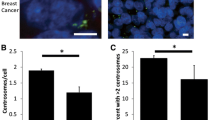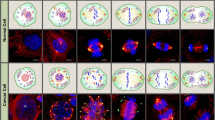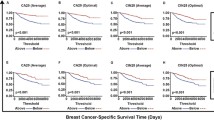Abstract
Molecular mechanisms leading to genomic instability and phenotypic variation during tumor development and progression are poorly understood. Such instability represents a major problem in the management of breast cancer because of its contribution to more aggressive phenotypes as well as chemoresistance. In this study we analyzed breast carcinomas and tumor-derived cell lines to determine the relationship between centrosome amplification and established prognostic factors. Our results show that centrosome amplification can arise independent of ER or p53 status and is a common feature of aneuploid breast tumors. Centrosome amplification is associated with mitotic spindle abnormalities in breast carcinomas and thus may contribute to genomic instability and the development of more aggressive phenotypes during tumor progression.
Similar content being viewed by others
References
Lengauer C, Kinzler KW, Vogelstein B: Genetic instabilities in human cancers. Nature 396: 643–649, 1998
Loeb LA: A mutator phenotype in cancer. Cancer Res 61: 3230–3239, 2001
Russo J, Hu Y-F, Yang X. Russo IH: Developmental, cellular, and molecular basis of human breast cancer. J Natl Cancer Instit Monogr 27: 17–37, 2000
Khan SA, Rogers MA, Khurana KK, Meguid MM, Numann PJ: Estrogen receptor expression in benign breast epithelium and breast cancer risk. J Natl Cancer Inst 90: 37–42, 1998
Thor A, Yandell D: Molecular pathology of breast carcinoma. In: Harris J, Lippman M, Morrow M, Hellman S (eds) Diseases of the Breast. Lippincott-Raven, Philadelphia, 1996, pp 445–454
Brinkley BR: Managing the centrosome numbers game: from chaos to stability in cancer cell division. Trends Cell Biol 11: 18–21, 2001
Carroll PE, Okuda M, Horn HF, Biddinger P, Stambrook PJ, Gleich LL, Li YQ, Tarapore P, Fukasawa K: Centrosome hyperamplification in human cancer: chromosome instability induced by p53 mutation and/or Mdm2 overexpression. Oncogene 18: 1935–1944, 1999
Ghadimi BM, Sackett DL, Difilippantonio MJ, Schrock E, Neumann T, Jauho A, Auer G, Ried, T: Centrosome amplification and instability occurs exclusively in aneuploid, but not in diploid colorectal cancer cell lines, and correlates with numerical chromosomal aberrations. Genes Chrom Cancer 27: 183–190, 2000
Lingle WL, Lutz WH, Ingle JN, Maihle NJ, Salisbury JL: Centrosome hypertrophy in human breast tumors: implications for genomic stability and cell polarity. Proc Natl Acad Sci USA 95: 2950–2955, 1998
Pihan GA, Purohit A, Wallace J, Knecht H, Woda B, Quesen-berry P, Doxsey SJ: Centrosome defects and genetic instability in malignant tumors. Cancer Res 58: 3974–3985, 1998
Zhou H, Kuang J, Zhong L, Kuo WL, Gray JW, Sahin A, Brinkley BR, Sen S: Tumour amplified kinase STK15/BTAK induces centrosome amplification, aneuploidy and transformation. Nat Genet 20: 189–193, 1998
Duensing S, Duensing A, Crum CP, Munger K: Human Papil-lomavirus type 16 E7 oncoprotein-induced abnormal centrosome synthesis is an early event in the evolving malignant phenotype. Cancer Res 61: 2356–2360, 2001
Fukasawa K, Choi T, Kuriyama R, Rulong S, Vande Woude GF: Abnormal centrosome amplification in the absence of p53. Science 271: 1744–1747, 1996
Murphy KL, Dennis AP, Rosen JM: A gain of function p53 mutant promotes both genomic instability and cell survival in a novel p53-null mammary epithelial cell model. Faseb J 14: 2291–2302, 2000
Wang XJ, Greenhalgh DA, Jiang A, He D, Zhong L, Brinkley BR, Roop DR: Analysis of centrosome abnormalities and angiogenesis in epidermal-targeted p53172H mutant and p53-knockout mice after chemical carcinogenesis: evidence for a gain of function. Mol Carcinog 23: 185–192, 1998
Hinchcliffe EH, Miller FJ, Cham M, Khodjakov A, Sluder G: Requirement of a centrosomal activity for cell cycle pro-gression through G1 into S phase. Science 291: 1547–1550, 2001
Lacey KR, Jackson PK, Stearns T: Cyclin-dependent kinase control of centrosome duplication. Proc Natl Acad Sci USA 96: 2817–2822, 1999
Mantel C, Braun SE, Reid S, Henegariu O, Liu L, Hangoc G, Broxmeyer HE: p21(cip-1/waf-1) deficiency causes de-formed nuclear architecture, centriole overduplication, poly-ploidy, and relaxed microtubule damage checkpoints in human hematopoietic cells. Blood 93: 1390–1398, 1999
McShea A, Samuel T, Eppel JT, Galloway DA, Funk JO: Identification of CIP-1-associated regulator of cyclin B (CARB), a novel p21-binding protein acting in the G2 phase of the cell cycle. J Biol Chem 275: 23181–23186, 2000
Hollander MC, Sheikh MS, Bulavin DV, Lundgren K, Augeri-Henmueller L, Shehee R, Molinaro TA, Kim KE, Tolosa E, Ashwell JD, Rosenberg MP, Zhan Q, Fernandez-Salguero PM, Morgan WF, Deng CX, Fornace Jr AJ: Genomic in-stability in Gadd45a-deficient mice. Nat Genet 23: 176–184, 1999
Lingle WL, Salisbury JL: Altered centrosome structure is associated with abnormal mitoses in human breast tumors. Am J Pathol 155: 1941–1951, 1999
Lingle WL, Salisbury JL: Methods for the analysis of centro-some reproduction in cancer cells. Meth Cell Biol 67: 325–336, 2001
Salisbury JL, Lingle WL, White RA, Cordes LE, Barrett S: Microtubule nucleating capacity of centrosomes in tissue sections. J Histochem Cytochem 47: 1265–1274, 1999
Whitehead CM, Winkfein RJ, Rattner JB: The relationship of HsEg5 and the actin cytoskeleton to centrosome separation. Cell Motil Cytoskel 35: 298–308, 1996
Lingle WL, Barrett SL, Negron VC, D'Assoro AB, Boeneman K, Liu W, Whitehead CM, Reynolds C, Salisbury JL: Centrosome amplification drives chromosomal instability in breast tumor development. Proc Natl Acad Sci USA (in press): 2001
Halling KC, King W, Sokolova IA, Meyer RG, Burkhardt HM, Halling AC, Cheville JC, Sebo TJ, Ramakumar S, Stewart CS, Pankratz S, O'Kane DJ, Seelig SA, Lieber MM, Jenkins RB: A comparison of cytology and fluorescence in situ hybridization for the detection of urothelial carcinoma. J Urol 164: 1768–1775, 2000
Persons DL, Robinson RA, Hsu PH, Seelig SA, Borell TJ, Hartmann LC, Jenkins RB: Chromosome-specific aneusomy in carcinoma of the breast. Clin Cancer Res 2: 883–888, 1996
Sokolova IA, Halling KC, Jenkins RB, Burkhardt HM, Meyer RG, Seelig SA, King W: The development of a multitarget, multicolor fluorescence in situ hybridization assay for the detection of urothelial carcinoma in urine. J Mol Diagn 2: 116–123, 2000.
Liu W, Smith DI, Rechtzigel KJ, Thibodeau SN, James CD: Denaturing high performance liquid chromatography (DH-PLC) used in the detection of germline and somatic mutations. Nucl Acids Res 26: 1396–1400, 1998
King WJ, Greene GL: Monoclonal antibodies localize oestrogen receptor in the nuclei of target cells. Nature 307: 745–747, 1984
deFazio A, Chiew YE, Sini RL, Janes PW, Sutherland RL: Expression of c-erbB receptors, heregulin and oestrogen receptor in human breast cell lines. Int J Cancer 87: 487–498, 2000
Wosikowski K, Regis JT, Robey RW, Alvarez M, Buters JT, Gudas JM, Bates SE: Normal p53 status and function despite the development of drug resistance in human breast cancer cells. Cell Growth Differ 6: 1395–1403, 1995
Price JE: Metastasis from human breast cancer cell lines. Breast Cancer Res Treat 39: 93–102, 1996
Clarke R, Leonessa F, Brünner WN, Thompson, EW: In vitro models. In: JR Harris (ed) Diseases of the Breast. Lippincott Williams, Philadelphia, 2000, pp 335–354
Keydar I, Chen L, Karby S, Weiss FR, Delarea J, Radu M, Chaitcik S, Brenner HJ: Establishment and characterization of a cell line of human breast carcinoma origin. Eur J Cancer 15: 659–670, 1979
Soule HD, Vazguez J, Long A, Albert S, Brennan M: A human cell line from a pleural effusion derived from a breast carcinoma. J Nat Cancer Inst 51: 1409–1416, 1973
Anbazhagan R, Gelber RD, Bettelheim R, Goldhirsch A, Gusterson BA: Association of c-erbB-2 expression and S-phase fraction in the prognosis of node positive breast cancer. Ann Oncol 2: 47–53, 1991
Wenger CR, Beardslee S, Owens MA, Pounds G, Oldaker T, Vendely P, Pandian MR, Harrington D, Clark GM, McGuire WL: DNA ploidy, S-phase, and steroid receptors in more than 127,000 breast cancer patients. Breast Cancer Res Treat 28: 9–20, 1993
Gunther T, Schneider-Stock R, Rys J, Niezabitowski A, Roessner A: p53 gene mutations and expression of p53 and mdm2 proteins in invasive breast carcinoma. A comparative analysis with clinico-pathological factors. J Cancer Res Clin Oncol 123: 388–394, 1997
O'Reilly SM, Camplejohn RS, Barnes DM, Millis RR, Allen D, Rubens RD, Richards MA: DNA index, S-phase fraction, histological grade and prognosis in breast cancer. Br J Cancer 61: 671–674, 1990
Hinchcliffe EH, Li C, Thompson EA, Maller JL, Sluder G: Requirement of Cdk2-cyclin E activity for repeated centrosome reproduction in Xenopus egg extracts. Science 283: 851–854, 1999
Hsu LC, White RL: BRCA1 is associated with the centrosome during mitosis. Proc Natl Acad Sci USA 95: 12983–12988, 1998
Meraldi P, Lukas J, Fry A, Bartek J, Nigg E: Centrosome duplication in mammalian somatic cells requires E2F and Cdk2-cyclin A. Nature Cell Biol 1: 88–93, 1999
Mussman JG, Horn HF, Carroll PE, Okuda M, Tarapore P, Donehower LA, Fukasawa K: Synergistic induction of centrosome hyperamplification by loss of p53 and cyclin E overexpression. Oncogene 19: 1635–1646, 2000
Xu X, Weaver Z, Linke SP, Li C, Gotay J, Wang XW, Harris CC, Ried T, Deng CX: Centrosome amplification and a defect-ive G2-M cell cycle checkpoint induce genetic instability in BRCA1 exon 11 isoform-deficient cells. Mol Cell 3: 389–395, 1999
Tutt A, Gabriel A, Bertwistle D, Connor F, Paterson H, Peacock J, Ross G, Ashworth A: Absence of Brca2 causes genome instability by chromosome breakage and loss associ-ated with centrosome amplification. Curr Biol 9: 1107–1110, 1999
Bange J, Zwick E, Ullrich A: Molecular targets for breast cancer therapy and prevention. Nat Med 7: 548–552, 2001
Sato N, Mizumoto K, Nakamura M, Maehara N, Minamishima YA, Nishio S, Nagai E, Tanaka M: Correlation between centro-some abnormalities and chromosomal instability in human pancreatic cancer cells. Cancer Genet Cytogenet 126: 13–19, 2001
Pihan GA, Purohit A, Wallace J, Malhotra R, Liotta L, Doxsey SJ: Centrosome defects can account for cellular and genetic changes that characterize prostate cancer progression. Cancer Res 61: 2212–2219, 2001
Cariou S, Donovan JC, Flanagan WM, Milic A, Bhattacharya N, Slingerland JM: Down-regulation of p21WAF1/CIP1 or p27Kip1 abrogates antiestrogen-mediated cell cycle arrest in human breast cancer cells. Proc Natl Acad Sci USA 97: 9042–9046, 2000
Keyomarsi K, Conte D, Toyofuku W, Fox MP: Deregulation of cyclin E in breast cancer. Oncogene 11: 941–950, 1995
Author information
Authors and Affiliations
Rights and permissions
About this article
Cite this article
D'Assoro, A.B., Barrett, S.L., Folk, C. et al. Amplified Centrosomes in Breast Cancer: A Potential Indicator of Tumor Aggressiveness. Breast Cancer Res Treat 75, 25–34 (2002). https://doi.org/10.1023/A:1016550619925
Issue Date:
DOI: https://doi.org/10.1023/A:1016550619925




